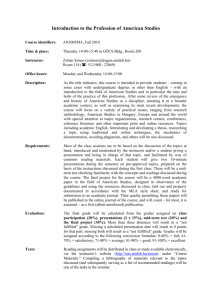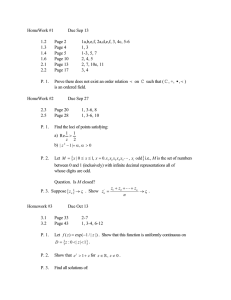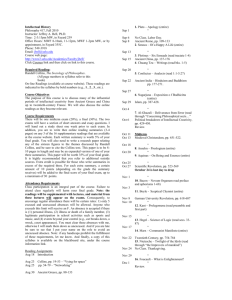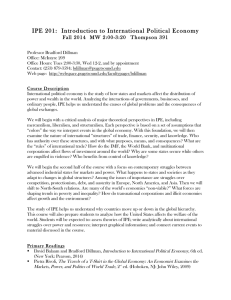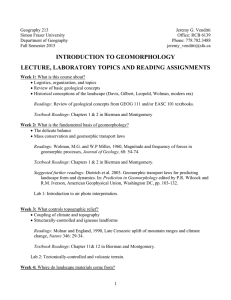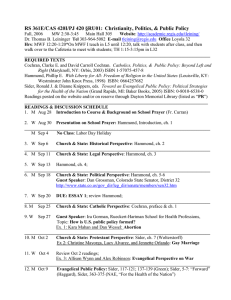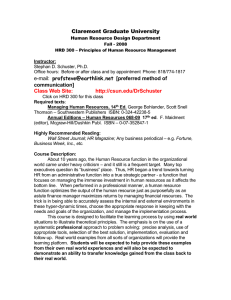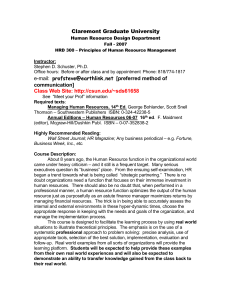FL 2014 J-427(21), History of Mass Comm. Prof.: P. Strother-Adams
advertisement
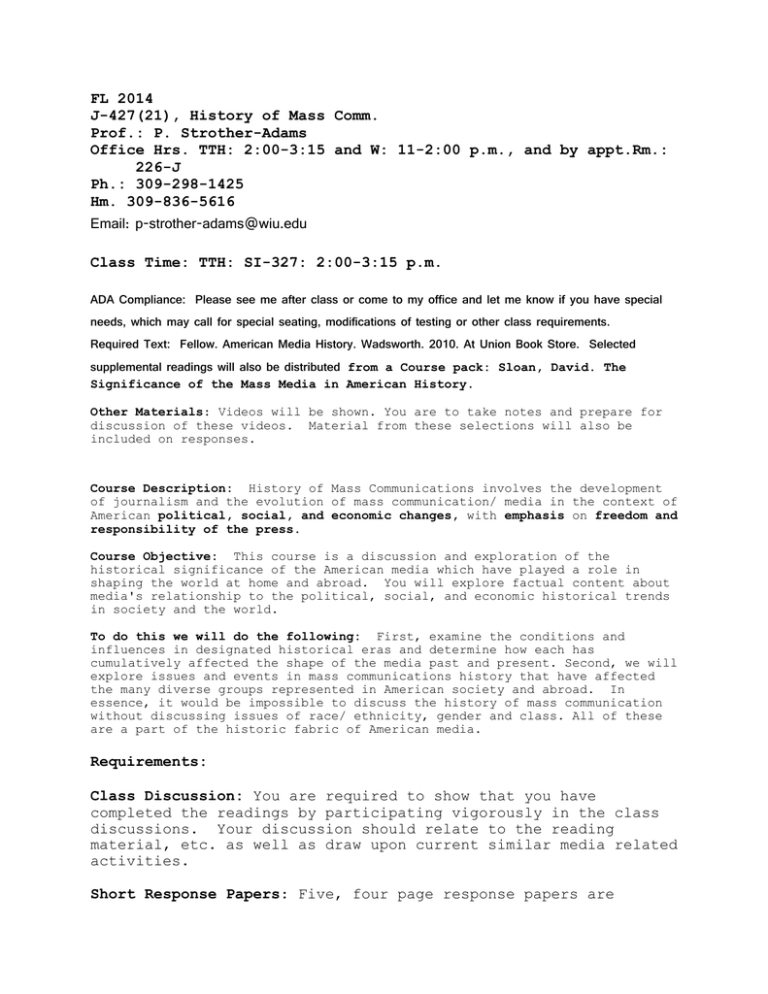
FL 2014 J-427(21), History of Mass Comm. Prof.: P. Strother-Adams Office Hrs. TTH: 2:00-3:15 and W: 11-2:00 p.m., and by appt.Rm.: 226-J Ph.: 309-298-1425 Hm. 309-836-5616 Email: p-strother-adams@wiu.edu Class Time: TTH: SI-327: 2:00-3:15 p.m. ADA Compliance: Please see me after class or come to my office and let me know if you have special needs, which may call for special seating, modifications of testing or other class requirements. Required Text: Fellow. American Media History. Wadsworth. 2010. At Union Book Store. Selected supplemental readings will also be distributed from a Course pack: Sloan, David. The Significance of the Mass Media in American History. Other Materials: Videos will be shown. You are to take notes and prepare for discussion of these videos. Material from these selections will also be included on responses. Course Description: History of Mass Communications involves the development of journalism and the evolution of mass communication/ media in the context of American political, social, and economic changes, with emphasis on freedom and responsibility of the press. Course Objective: This course is a discussion and exploration of the historical significance of the American media which have played a role in shaping the world at home and abroad. You will explore factual content about media's relationship to the political, social, and economic historical trends in society and the world. To do this we will do the following: First, examine the conditions and influences in designated historical eras and determine how each has cumulatively affected the shape of the media past and present. Second, we will explore issues and events in mass communications history that have affected the many diverse groups represented in American society and abroad. In essence, it would be impossible to discuss the history of mass communication without discussing issues of race/ ethnicity, gender and class. All of these are a part of the historic fabric of American media. Requirements: Class Discussion: You are required to show that you have completed the readings by participating vigorously in the class discussions. Your discussion should relate to the reading material, etc. as well as draw upon current similar media related activities. Short Response Papers: Five, four page response papers are required. These will emanate from text readings, handouts, videos, and discussions. Any and all material covered in class or distributed in class as assigned readings may be included. , Chapter Presentation of Readings: Each student will lead a chapter discussion or supplementary reading discussion. Concentrate on the theme and main point of the reading. Do not read to the class. Your discussion should be informative. Final Paper: You will complete one major ten page paper. The focus of this paper will be the significance of mass media on popular culture, which dates from the late 1970's to the present. This paper will involve both research and observation analysis. You will also present a short synopsis of this paper to the class. Your presentation will be accompanied by an abstract (outline or summary of your discussion) and a short video presentation. You will use a minimum of five sources for the completion of the paper, which may be a combination of current books and articles. Unsubstantiated Internet articles are not acceptable. Further explanation will be provided. Policy: Plagiarism is not allowed and could result in a grade of "F" for the course. Sources will be randomly checked from time to time. If you are not clear as to what Plagiarism is, please make an appointment to discuss this with me in my office. Attendance is mandatory. Keep in mind Attendance Policy: You are excused three absences to this class--no questions asked--no explanation needed. For each absence beyond three, I will deduct an automatic half grade from your final grade for Attendance/ Participation. For each absence beyond five, I will also deduct an additional one half grade from your final grade. No further explanation will be provided. There will be no excused absences beyond the three. You are advised to use your three days as you would sick days on a job--”wisely.” Participation and Absence: If you are absent, it is your responsibility to contact a classmate and find out what you have missed and what you will need in order to be prepared for the next class. You will be expected to follow through as usual. Absence is no excuse for falling behind. If you are absent, to avoid a late grade on an assignment, you should give the work to another student to turn in or place it in my mailbox on the day due (located on the first floor, Simpkins 122). Tardy to class: Lateness to class will have the same effect as absences since the effect is the same. More than five minutes late to class should be explained at the end of class or you will be counted absent. If this lateness is unavoidable on a regular basis due to other obligations, you should drop this class and take another more conducive to your schedule. Grading Formula: Each graded work will receive a letter grade and a percentage grade. This should make calculations easy for you. Written Responses: Student Chapter presentations Discussion and Participation and class discussion Final Paper: Total: 40% 15% 15% (calculated from attendance participation) 30% (first draft=10% of the 30%) 100% (New Grading Scale: Using plus minus scale is mandatory) 100-96=A; 95-90=A; 89-87=B+;86-85=B+; 84-80=B; 79-77=C+;76-75=C; 74-70=C; 69-67=D+; 666-65=D; 64-60=D- and all below equal F. Reading assignments will be made daily. Text readings will follow. An attached schedule of Expect changes to this syllabus. Any changes will be announced. Class Schedule: J-427: History of Mass Comm Class Reading and Discussion List Aug. 25 Wk. 1: for Sep. 1 Week 2: Introduction: Syllabus What is mass comm? Mass Comm History Theory: Historical search significance (handout c. 1) Labor Day Week Historical Search, contd. (same handout) Sep. 8 Week 3: Response #1 Due Ch.1: The Colonial Years Sep. 15 Week 4: Ch. 2: The Press and the Revolution Sep. 21 Week 5: Ch. 3: The Press and Founding of a Natin Sep. 28 Week 6: response #2 Due Ch. 4: A Press for the Masses Oct. 6 week 7: Ch. 5: A Divided Media Oct. 13 Week 8: Ch. 6: The Yellow Press and the Times Oct. 20 Week 9: Ch. 7: Magazines, Muckracking, PR Oct. 27 week 10: response #3 Due Ch. 8: American Film Nov. 3 week 11: Ch. 9: Radio ...its Promises Nov. 10 week 12: Ch.10: Television Progress and Problems Ch.13: The Internet Exploration Nov. 17 Week 13: Response #4 Due Ch. 11: Advertising as a Social, Economic and Political Force Nov. 24 Fall Break Dec. 1 Week 14: Dec.8 Week 15: guidelines) Dec. 15 Ch.12: The Media and the National Crisis Final Response #5 Due Presentation of final projects (see Week 16: fifty minutes. Final Exam Week Tuesday @ 3:00: All finals are one hour and
